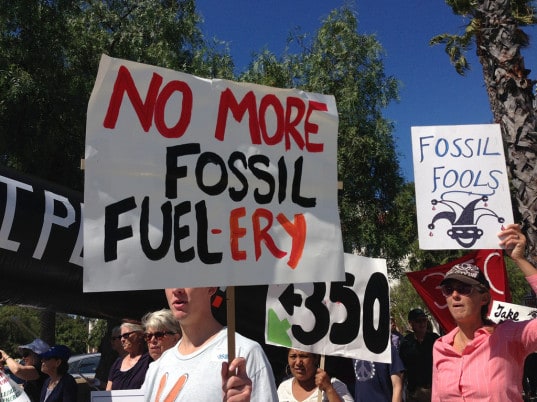
For nearly four years, students at universities across the United States have been fighting to divest their schools’ endowments from the fossil fuel industry. Divestment activists want universities to sell all of their shares in companies involved in fossil fuel extraction and distribution. They claim that divestment will spark a national debate about climate change and force fossil fuel companies to capitulate to the demands of the environmental movement. While campus divestment groups have recently made sizable gains by convincing fifteen universities, including Stanford, to divest from fossil fuel companies, divestment has the unintended consequence of hurting both students and the environment.
Environmental groups have for years told universities that they have an obligation to take a stand against climate change. Some schools have responded by taking concrete actions to reduce their carbon footprint, such as cutting their energy use and building green campuses. These choices make a small difference in the amount of carbon dioxide being released into the environment, and come with negligible costs because of lower energy bills and generous government tax credits. Yet, instead of continuing to push for these relatively inexpensive projects, activists have shifted their main focus towards forcing universities to divest.
Student activists are convinced that divesting will somehow make the fossil fuel industry slow down its rate of drilling and mining. Regardless of the debatable merits of this goal, it will not happen—even if the divestment movement successfully convinces every university in the United States to divest.
Environmental groups point to divestment’s historic success by citing the case of apartheid South Africa. During the 1980s, campuses and companies across the United States divested from the South African government and many of the country’s businesses. Environmental activists argue that divestment was one of the main reasons apartheid was eventually brought to an end. However, this claim is disputed by academics, most notably University of California (Los Angeles) professor Ivo Welch. In a 1999 study, Welch found that “the announcement of divestment from South Africa, not only by universities but also by state pension funds, had no discernible effect on the valuation of companies that were being divested, either short-term or long-term.”
If the South Africa divestment movement had no real effect on apartheid, it is even less likely that the fossil fuel industry will be forced to change its ways. The fossil fuel industry is much larger than South Africa’s economy was in the 1980s, and would be able to absorb a similar level of divestment without affecting its finances.
Even if divestment does not change the way fossil fuel firms operate, environmentalists still claim that universities should divest to send a message to the world that they are taking a stand against climate change. It is hard to take this argument seriously when universities and students would suffer as a result of divestment.
Swarthmore College, the birthplace of the divestment movement, has released a study showing that if the school were to divest, it would lose between $20 million and $26 million of revenue from its endowment every year over the next 10 years. Wellesley College, which has a similarly sized endowment, estimated that annual revenue losses from divestment over the next 10 years would average almost $21 million. Pomona College estimated an annual $6.6 million decrease in possible salary and financial aid spending from divestment. These losses occur because divestment forces universities to remove themselves from the commingled funds that they currently use as investment vehicles. Since commingled funds have a large number of investors to reduce costs, individual universities are unable to change fund investments to prevent investment in fossil fuels. While a few firms offer commingled funds with restrictions on fossil fuel investment, their returns are lower and their fees are often higher than a standard investment strategy.
It may make sense to prioritize taking a stand on climate change over revenue if you are a private individual or even a privately held business, but it makes no sense for colleges when the loss of revenue will prevent them from providing opportunities to students. Swarthmore currently has a $1.5 billion endowment, and it claims that if its endowment returns decline because of divestment it will have to cut financial aid. Many schools do not have the luxury of having such a large endowment. If Swarthmore would be unable to maintain its current spending on financial aid with divestment, students at schools with endowments in the millions rather than the billions would fare far worse.
Colleges have an obligation to give their students the best opportunities to succeed later in life. Universities fail their students if, through divestment, they force students to take on additional loans and increase their financial burden. With outstanding student loan debt standing at over $1.1 trillion, schools should work to lower the crushing debt burden, not increase its weight.
It is counterintuitive that by divesting, universities give up the one way they can currently change how the fossil fuel industry operates. In the past, universities and other large shareholders have used their shareholder rights and taken action to force the fossil fuel industry to regulate itself and adopt more responsible extraction practices. By capitulating to the demands of students, universities may end up harming long-term goals and perpetuating the status quo that they deemed unacceptable.
While campus activists across the country are building momentum for the divestment movement, universities ought to ignore their shortsighted demands and instead continue to hold fossil fuel investments, following the example of Swarthmore, Harvard, and others. Divestment is not in the best interest of universities nor the environmental movement. More important, it is a betrayal of students across the country.
Saffron extract: This costly, unique spice that’s steadily used in Middle
Eastern cooking has much folklore describing its capability to loosen up
mood, however fashionable science hasn’t discovered it is a “miracle urge for food suppressant” as Oz has claimed.